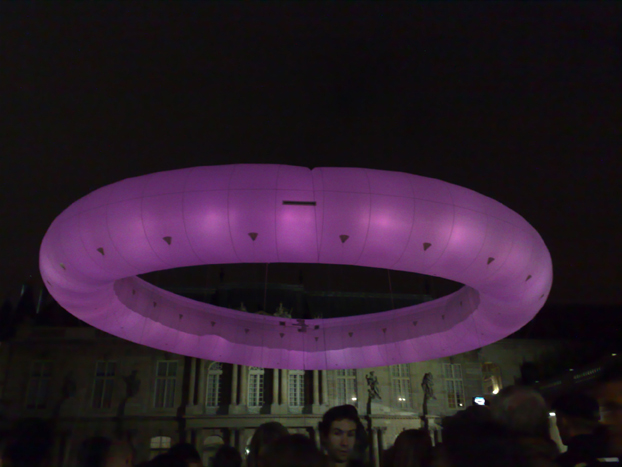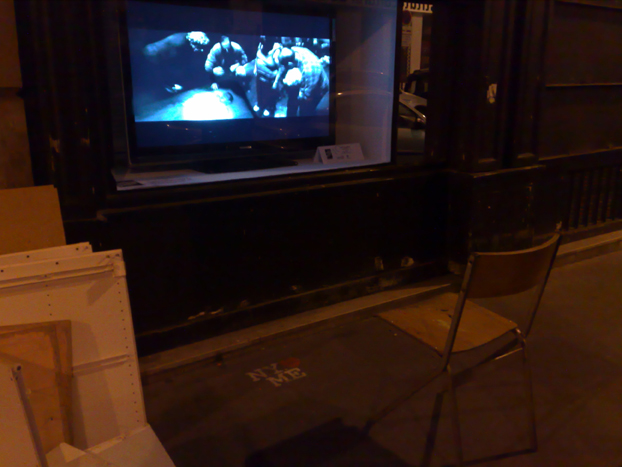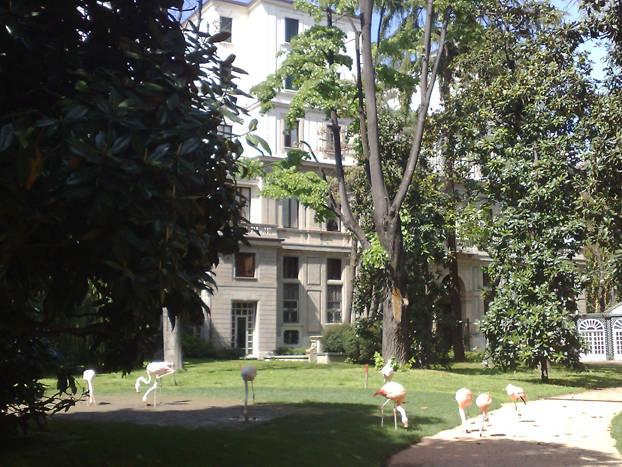04 October 2009
White light, white heat
In the Nuit Blanche, I'm rarely struck by the artistic value of a piece. What usually motivates me to walk around town at night, and face the crowd is the display of the piece, the use of the night, the use of the exhibition space, how it meets me randomly. It's a very paradoxical event made to bring art out of the galleries, in the urban space, at nighttime, free for everyone to encounter. But it turns out to have become less about art and more about fun. That's why videos for me hardly work in that context : you don't look at the video, you look at the light it makes around. Therefore is the Nuit Blanche a guilt trip into enjoying light and sound at night, out in the air, in dark corners, churches, window stores, gardens, old dusty historical buildings? I think so very much. Is it art? Sometimes. I remember one of the early Nuit Blanche, Alain Séchas was taking over the Palais de Versailles. It was very compelling. But I'm not sure it had to do with the Nuit Blanche itself and I gather the new look at contemporary art by the curators of Versailles had started then.
Last night, I just went around my old neighborhood Le Marais (I should post about it one day, about how it's slowly becoming soulless) where you can usually find dozens of pieces displayed around because there are so many of those old dusty historical buildings.
Nothing of note, except some sort of inflated pink ring over the Archives Nationales which makes for super cool pictures (the invasion of the alien art from Planet Crowd Pleasing?) and a lonely chair in front of gallery Yvon Lambert, which displayed in its window a video of which I don't remember the author's name nor what it was about. And yet I did sit on that chair. I guess I was too distracted by the experience...
Maybe that's why I'm still glad the event exists, first because you should always try to turn the city into a playground once in a while and second because dark corners do offer the best place for your imagination.


Last night, I just went around my old neighborhood Le Marais (I should post about it one day, about how it's slowly becoming soulless) where you can usually find dozens of pieces displayed around because there are so many of those old dusty historical buildings.
Nothing of note, except some sort of inflated pink ring over the Archives Nationales which makes for super cool pictures (the invasion of the alien art from Planet Crowd Pleasing?) and a lonely chair in front of gallery Yvon Lambert, which displayed in its window a video of which I don't remember the author's name nor what it was about. And yet I did sit on that chair. I guess I was too distracted by the experience...
Maybe that's why I'm still glad the event exists, first because you should always try to turn the city into a playground once in a while and second because dark corners do offer the best place for your imagination.


Labels: Alain Séchas, Art, City, le marais, Nuit Blanche, Space, urban, versailles
05 May 2009
A moment of urban poetry
As soon as I heard you could see pink flamingos going about freely in a parc in the middle of Milan, I started looking for them.
Strangely, neither tourist guides nor the web have much indication about them - and I discovered why : they go about in a private parc. But through a gate, you can still watch them, closely and stop the urban time passing around you. They're so amazing. I love especially looking at their skinny, fragile-looking legs.
Thanks to a Flickr post, I got the address. They can be found in Via Cappucini, 9 in the garden of the beautiful Palazzo Invernizzi.
I wish I had a proper camera with me that day, but I'm happy nonetheless I grabbed with my phone a souvenir of this incredible urban moment (the Flickr pict is very nice for a more "artistic" capture of the spectacle).

Strangely, neither tourist guides nor the web have much indication about them - and I discovered why : they go about in a private parc. But through a gate, you can still watch them, closely and stop the urban time passing around you. They're so amazing. I love especially looking at their skinny, fragile-looking legs.
Thanks to a Flickr post, I got the address. They can be found in Via Cappucini, 9 in the garden of the beautiful Palazzo Invernizzi.
I wish I had a proper camera with me that day, but I'm happy nonetheless I grabbed with my phone a souvenir of this incredible urban moment (the Flickr pict is very nice for a more "artistic" capture of the spectacle).

Labels: City, Milan, Palazzo Invernizzi, Pink flamingos, urban
23 November 2007
Striking!
Today marked the end of the strike, the subway runs pretty much as usual, nobody is complaining anymore. It's as if nothing happened. During the last 10 days, the TV news kept on showing us how unhappy people were that they couldn't go to work and how angry they were that a minority would go on strike to keep their privileges, namely an early retirement.
Contrary to common beliefs, a long strike like this one is pretty unusual in France. The last one of a similar importance was in december 1995, 12 years ago. It lasted 3 weeks and ended just in time for the Christmas shopping. Because if there's something that French people love to do more than to go to work is to go shopping. I was last Saturday at the Galeries Lafayette gourmet, full as ever, at the heart of strike period and somewhat people managed to come all the way down there, with all the nearby subway and train lines down, and there were no TV cameras to show that the strike was after all not so constraining for the French economy.
I can understand the arguments of the train workers, they're right - why would they want to keep doing after 50 such a tedious job? And also, I can understand that in the configuration of our economy maintaining early retirements is not really possible anymore. So why not using this opportunity to question the relationship to work itself? With the current president "work more to earn more" Sarkozy, the notion of work as the ultimate modern value is statufied. But the real revolution is to be able to choose a job that makes you happy or at least that you wouldn't want to leave "early" in your career or that maybe is not getting you at the end of the day to burn your life with alcohol, and anti-depressants and cocaine. The leaders of the economy are exploiting the need for people to get a job that will at least sustain basic expenses - all they care for is to make sure they are profitable, and that in a nice convenient loop, they can spend the small money they earn in a desperate gesture cynically called "pouvoir d'achat" (consuming power) which is the only power they will ever feel in their life: because when you've been spending your day feeling "you're nothing" at work, all you can do is buy and buy more at your turn to feel "you're something".
This actually puts the act of consumption at the heart of the next revolution, between ecological, political and economical awareness: what you buy, how you buy it, where you buy it, why, etc... More and more, I'm interested in alternative theories like "décroissance" or "degrowth". It's fascinating because it puts the problem upside down and for that only, I like it.
And finally, as it was the case in 1995, this strike was very valuable if only for one thing: rediscovering the relationship to the city, to the ways you move in it, to the ways you get from one point to another, and to time (for instance, instead of making sure I want the shortest time spent between the place where I am and where I should be, I have to think of what I'm going to do in the time that I wait - mainly walk - and through what part of the cities).
Contrary to common beliefs, a long strike like this one is pretty unusual in France. The last one of a similar importance was in december 1995, 12 years ago. It lasted 3 weeks and ended just in time for the Christmas shopping. Because if there's something that French people love to do more than to go to work is to go shopping. I was last Saturday at the Galeries Lafayette gourmet, full as ever, at the heart of strike period and somewhat people managed to come all the way down there, with all the nearby subway and train lines down, and there were no TV cameras to show that the strike was after all not so constraining for the French economy.
I can understand the arguments of the train workers, they're right - why would they want to keep doing after 50 such a tedious job? And also, I can understand that in the configuration of our economy maintaining early retirements is not really possible anymore. So why not using this opportunity to question the relationship to work itself? With the current president "work more to earn more" Sarkozy, the notion of work as the ultimate modern value is statufied. But the real revolution is to be able to choose a job that makes you happy or at least that you wouldn't want to leave "early" in your career or that maybe is not getting you at the end of the day to burn your life with alcohol, and anti-depressants and cocaine. The leaders of the economy are exploiting the need for people to get a job that will at least sustain basic expenses - all they care for is to make sure they are profitable, and that in a nice convenient loop, they can spend the small money they earn in a desperate gesture cynically called "pouvoir d'achat" (consuming power) which is the only power they will ever feel in their life: because when you've been spending your day feeling "you're nothing" at work, all you can do is buy and buy more at your turn to feel "you're something".
This actually puts the act of consumption at the heart of the next revolution, between ecological, political and economical awareness: what you buy, how you buy it, where you buy it, why, etc... More and more, I'm interested in alternative theories like "décroissance" or "degrowth". It's fascinating because it puts the problem upside down and for that only, I like it.
And finally, as it was the case in 1995, this strike was very valuable if only for one thing: rediscovering the relationship to the city, to the ways you move in it, to the ways you get from one point to another, and to time (for instance, instead of making sure I want the shortest time spent between the place where I am and where I should be, I have to think of what I'm going to do in the time that I wait - mainly walk - and through what part of the cities).
Labels: City, Economy, Politics, Shopping, Work
19 September 2007
Hidden practices
In a city, you don't have many opportunities to do private things in a public environment, sometimes your only option is... public toilets... (especially I guess, when your home is not so private or when you actually don't have a home).
The in-between-ness team stroke again: as I was reading their call for participation, a scene from "Prick up your ears" came to mind... Or also, just yesterday, David described to me the state of the public toilets at the Gare du Nord, run by a company called ironically "Mister Clean", as they couldn't be dirtier, with a special touch: serynges all over.
Good call.
--Joëlle.
***
A Public Inconvenience
The 3rd workshop in the in-between-ness series.
Subterranean, ceramic-tiled bathrooms, plastic temporary urinals or
compact, metallic washrooms in transit spaces; public toilets are an
often-overlooked space in our urban environment. Technologies designed
for the city often try to abstract away from the inconvenient
necessities which our bodies require; or, when they are designed
explicitly for public toilets, the focus is on supporting the cultural
values of hygiene and privacy. What do we miss by ignoring the fact
that public toilets are also the site for a variety of social
practices?
'A Public Inconvenience' will explore the experience and affect of
public toilets in an urban environment, in this case Amsterdam.
Through observation and engagement we will consider how public toilets
are shaped by, and themselves shape, cultural practices, values, and
attitudes. And further, how this essential part of the urban fabric
contributes to the everyday experience we have of our cities.
'A Public Inconvenience' is the third in a series of workshops
exploring in-between-ness in urban environments. That is, the places
and times that are often on the periphery of everyday life - the
journey to work or the time spent queuing in a shop.
To be considered for participation, researchers and practitioners are
invited to send us a compelling public toilet story (see The Stories
section of the website for inspiration), an optional toilet
photograph, a brief biography, and a short rationale outlining your
interest in the workshop. This document should not exceed two pages.
Submissions:
Send to karen.martin (at) ucl.ac.uk by 21st September 2007
Acceptance Notification is 28th September 2007
Further Information:
http://www.inbetweeness.org/apublicinconvenience/
Place and Time:
26th & 27th October 2007
Waag Society, Amsterdam
Organisers:
Arianna Bassoli (The London School of Economics)
Johanna Brewer (University of California, Irvine)
Karen Martin (Bartlett School of Graduate Studies)
Valentina Nisi (Fattoria Mediale)
Martine Posthuma de Boer (Fattoria Mediale)
***
The in-between-ness team stroke again: as I was reading their call for participation, a scene from "Prick up your ears" came to mind... Or also, just yesterday, David described to me the state of the public toilets at the Gare du Nord, run by a company called ironically "Mister Clean", as they couldn't be dirtier, with a special touch: serynges all over.
Good call.
--Joëlle.
***
A Public Inconvenience
The 3rd workshop in the in-between-ness series.
Subterranean, ceramic-tiled bathrooms, plastic temporary urinals or
compact, metallic washrooms in transit spaces; public toilets are an
often-overlooked space in our urban environment. Technologies designed
for the city often try to abstract away from the inconvenient
necessities which our bodies require; or, when they are designed
explicitly for public toilets, the focus is on supporting the cultural
values of hygiene and privacy. What do we miss by ignoring the fact
that public toilets are also the site for a variety of social
practices?
'A Public Inconvenience' will explore the experience and affect of
public toilets in an urban environment, in this case Amsterdam.
Through observation and engagement we will consider how public toilets
are shaped by, and themselves shape, cultural practices, values, and
attitudes. And further, how this essential part of the urban fabric
contributes to the everyday experience we have of our cities.
'A Public Inconvenience' is the third in a series of workshops
exploring in-between-ness in urban environments. That is, the places
and times that are often on the periphery of everyday life - the
journey to work or the time spent queuing in a shop.
To be considered for participation, researchers and practitioners are
invited to send us a compelling public toilet story (see The Stories
section of the website for inspiration), an optional toilet
photograph, a brief biography, and a short rationale outlining your
interest in the workshop. This document should not exceed two pages.
Submissions:
Send to karen.martin (at) ucl.ac.uk by 21st September 2007
Acceptance Notification is 28th September 2007
Further Information:
http://www.inbetweeness.org/apublicinconvenience/
Place and Time:
26th & 27th October 2007
Waag Society, Amsterdam
Organisers:
Arianna Bassoli (The London School of Economics)
Johanna Brewer (University of California, Irvine)
Karen Martin (Bartlett School of Graduate Studies)
Valentina Nisi (Fattoria Mediale)
Martine Posthuma de Boer (Fattoria Mediale)
***
Labels: City, Private, Public, Toilets, Workshop
